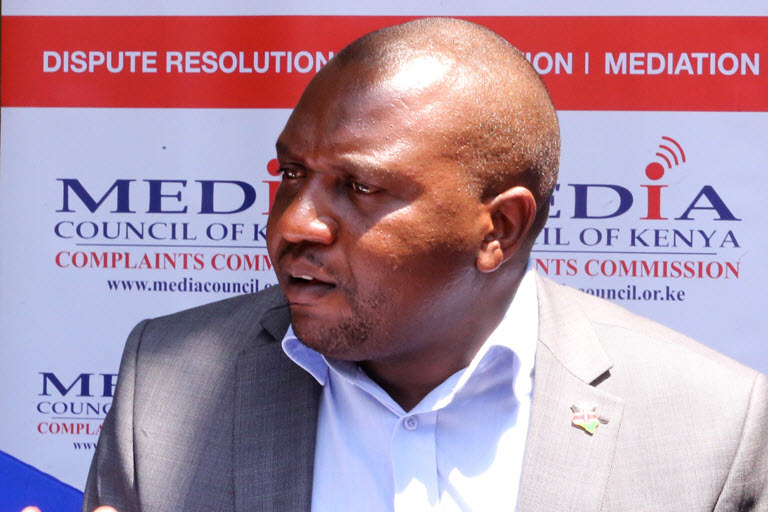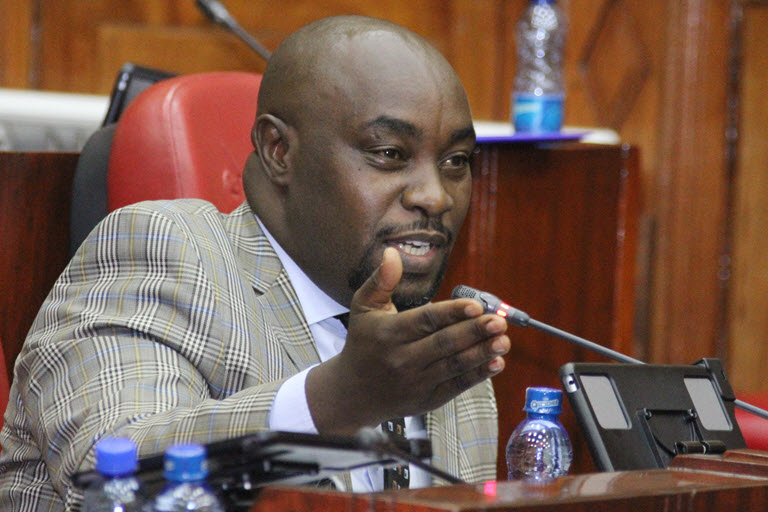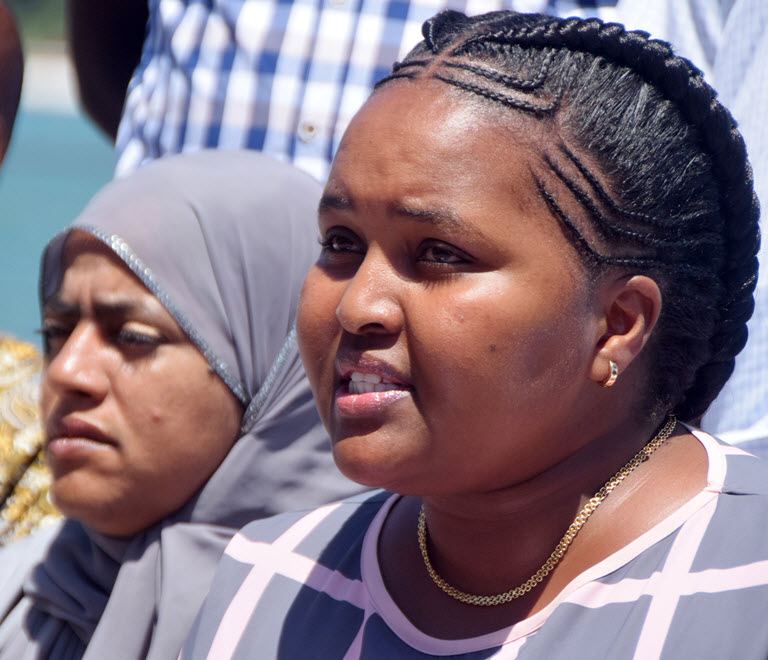The Media Council of Kenya (MCK) recently issued a raft of guidelines for covering the August 9, 2022, General Election. One of the new regulations requires media practitioners running for elective seats to resign by February 2022, six months to the polls. MCK argues that such a move is necessary to instil order and professionalism in the media industry.
According to the MCK Chief Executive Officer, David Omwoyo, journalists eyeing political posts should be subjected to the same rules that apply to civil servants. That is to leave office six months to elections. But that’s not the only requirement. “They [media or civil servants political aspirants: Editor’s note] are under strict edicts not to use their space and influence to campaign for political office,” Omwoyo added.
The MCK boss argued that the press regulatory body had received complaints from elected leaders about journalists, especially talk show hosts, using their position to launch ‘personal attacks’ against some political quarters. The MCK head cautioned that as media practitioners, journalists and editors wield immense influence and this power required them to be beyond reproach.
“The council is committed to ensuring that all journalists and media practitioners adhere to the expected standards and in line with the Code of Conduct for the Practice of journalists in Kenya,” MCK said.

A statement signed by Mr Omwoyo warned journalists against early campaigns. “We expect journalists and media practitioners intending to vie for elective positions not to use their positions to influence their campaigns or to attack or deny their opponent’s rightful space to sell their agenda,” the statement read.
MCK: New guidelines were inclusive
Maina Muiruri, MCK chairman, told the EAST Site that the guidelines were developed with input from all the relevant stakeholders, including the Kenya Editors Guild (KEG).
High-profile journalists, many of them veterans, comprised the committee that crafted the elections reporting guidelines. Joseph Odindo, a former editorial director of the Nation Media Group and later Standard MediaGroup, chaired the committee.

Other members included seasoned Kiswahili newsreader Jamila Mohamed, Jane Godia, Njeri Rugene, Sarah Kimani, Alphonce Shiundu, Bernard Mwinzi, David Okwembah and David Aduda. In addition, the KEG Vice- President Sophia Wanuna, Felix Olik, Samuel Maina, Khamadi Shitemi, David Mwere, Henry Owino, Alex Ikambi Mwangi, media scholar Prof. George Nyabuga, Ahosi K’Obonyo, Moses Njagi, Oscar Obonyo and Judie Kaberia were also part of the committee.
Quitting is not mandatory
Maina, a veteran journalist, having served in managerial roles at the Standard Media Group and laterMediamax Limited said that the guidelines are ‘not mandatory but should act as a reference point’.
“It is contained in Guidelines for Coverage of Elections in Kenya as opposed to Code of Conduct for Practice of Journalists which is entrenched in Media Council Act 2013,” he said.
“The guidelines are not new. They are usually reviewed by media stakeholders, not just the Media Council of Kenya alone.”
He said every election cycle; they review the guidelines. “One of the additions was whether we should have journalists who are still vying remain in the newsrooms. They are guidelines hence not forceable.”
For Muiruri, what the council has done is a goodwill gesture. “If a media house is facing a dilemma, they can look at some of the proposals that have been made.”
Journalists – wanting to go into politics – left in limbo
It is unclear how many practising journalists will be quitting the newsrooms to plunge into politics. However, Fredrick Akali, an experienced radio presenter at Mulembe FM, says he sees nothing wrong with the move. He intends to run for a Member of County Assembly (MCA) seat in Kisa Central Ward, Khwisero Khwisero Constituency, Kakamega County.
“To me, it is a good thing. If you are not careful, there is a very thin line between your profession and interests, so one can leave early and concentrate on political interests. During campaigns, one can get carried away, and it’s the most prudent thing to do.”
Akali reiterated that there was still a long way to go. “We also have party primaries which come in March, and so if you have to participate in them, then you need to be on the ground campaigning,” he explained, adding that the challenge most journalists contesting face is raising campaign finances.
Unlike the mature democracies in the West like the USA, Kenyan political candidates mainly finance their campaigns. Business moguls with vested interests sometimes back aspirants, and candidates do not make public their campaign expenditure.
Lawmakers recently shot down a proposal by the Independent and Electoral Boundaries Commission (IEBC) to have a cap on election expenditure.
Journalists face an uphill battle
“The challenge is that most of these journalists do not have resources, and if they leave early, they might be hit hard in the pocket,” Akali said. “It’s delicate balancing because holding onto their journalism may compromise their campaigns hence losing ground,” Akali concluded.
Meanwhile, the Kenya Union of Journalists(KUJ) Secretary-General Erick Oduor seems to back the guidelines.
“The truth of the matter is that when you want to contest, you leave early, get time and resources. So I’m encouraging more journalists to go and vie,” Oduor said.

Kenya’s 10th parliament already boasts of lawmakers who were former journalists, including Kitui Senator Enock Wambua.
Others are Lugari lawmaker Ayub Savula, a former print journalist with the Standard newspapers, and Naisula Lesuuda, a former newscaster at the Kenya Broadcasting Corporation (KBC) and who serves as Samburu West Member of Parliament.
 Isaac Swila
Isaac SwilaReport by Aga Khan University’s Media Innovation Centre analyses the country’s millennials and digital natives’ media consumption habits.
For the media to flourish, and the society to have free flow of accurate and verifiable information, journalists, the drivers in the passing of information are expected to be well grounded in laws and the legal aspect pertaining to the job, writes Alfred Ganzo.
Pitching provides numerous opportunities for your new or existing business ideas to be discovered and realized; and as Simon Mtabazi writes, some startups have become billion-dollar companies due to efffevie pitches
The success you achieve with your media startup business will heavily rely on your reputation as a trustworthy company, and as Nandi Mwiyombella writes, it will also open a new window for customers and potential investors.
That’s why I think today is such a great space for us to sit back and reflect on the questions that could help us shape the kind of journalism that we want to see in our local and global community.
The report specifically analysed eight major variables which include: newsroom structure and resources, media ownership and business models, organisational capacity, innovation culture, journalism culture, financial trends and results, content quality and COVID-19.
Mudi, in her role as Media Council of Kenya regional coordinator in charge of Mombasa(covering the entire coastal region), has found herself at the forefront in advocating and fighting to protect journalists’ rights, culminating in her being awarded for her peace efforts in the run-up and during the 2022 general elections in Kenya.
The 2022 general elections have been mentally draining for journalists, some of whom have had to stay on the campaign trail for over a year. Others have had to toy with the tough call of managing teams in the newsroom. East Site’s Isaac Swila and political writer Rawlings Otieno recount their experiences
What role did social media influencers play in the election? What voice did they give in political discourses during and around the election period? And to what extent did political candidates involve the influencers in marketing their manifestos to sway votes in their favour? East Site writer Steven Omondi unpacks the details
The media industry is experiencing enormous transformation as new digital trends emerge. With the vast opportunities that the digital space offers, media owners and content producers must deliberately adapt to how the audience consumes content.
With the increased Digital Technology at the palm of just anybody; there are a lot of information that distort whether deliberately or not highlighting the need of robust Fact0checking as Asha D. Abinallah explains
Is there a danger in media personalities having a vibrant social media presence? Assuming they have a massive media following, should they self-regulate and filter what they post? And when they engage with followers, should their opinions be taken as personal, or does it represent the journalist’s media house? East Site writer Isaac Swila explores
Media stakeholders are raising concerns over the lack of gender-inclusive reporting in East African newsrooms. They want concerted efforts to ensure more female journalists get equal opportunities like their male counterparts.
The partnership will also ensure that local content is curated and distributed to better optimize the product and meet the needs of Kenyan online users.
The news industry is constantly changing, and in the last few years, User Generated Content (UGC) has become a ubiquitous feature in news sourcing and packaging. However, media houses and journalists need to establish verification and credibility safeguards to avoid the misinformation trap.
Reporting on elections is, for many journalists, an opportunity to establish themselves as reliable political reporters. But the task comes with certain risks, particularly in the East African sub-region.
Stakeholders are now calling for concerted efforts, better planning and preparations for journalists before they are sent out on the field to cover Kenya’s high-stakes August 9 General Elections.
East Africa’s media grapples with a myriad of challenges whenever general elections approach. Not only do editors struggle with balancing the competing political interests, at times at the altar of professionalism, but individual journalists pay dearly, many suffering attacks in the course of their duties.
As Form One students settle into a new life in secondary school, this has also been a period of reflection. We have read tear-jerking and heart-warming stories of determined students who overcame many odds to get an education and how well-wishers came together in their aid.
There is renewed optimism in the Tanzanian media space following the ascension to power of President Samia Suluhu whose regime is keen to relax some of the laws deemed punitive to journalists and media houses
Uganda fell behind, whereas Kenya improved its press freedom ranking in the Reporters Without Borders 2022 Press Freedom Index. And after years of media freedom decline, Tanzania appears to be on the right track. But overall, media freedom activists say there is still work to be done.
A free and independent press is the cornerstone of any democracy and the foundation of economic success, mostly because through our free press, we’re able to hold the leadership to account.
To align with the changing times and stay relevant in the business, media houses are challenged to rethink their strategy and to adopt and understand obstacles and challenges they face towards rethinking and exploring alternative sources of revenue and on developing the digital strategy.
A team of young, Tanzanian tech-savvy communication professionals is dreaming big. It seeks to usher a new dawn in media business management in Tanzania by optimising employee output and offering consultancy to media businesses on how they can operate with a minimal budget but still attain their goals.
Bloggers and influencers have become an integral component of information sourcing across East Africa. The public uses blogs, privately run websites and social networks to crowdsource information from social networks, which they then publish and distribute. But it’s not all rosy for this group of content makers.
The chances of meeting a medical graduate practising journalism are usually very slim, especially in Sub-Saharan Africa. But two Tanzanian physicians have broken away from that norm by inventing a start-up called Afyatoon. It uses visual art technology to tell compelling medical stories. They narrate to the EAST Site their experience and share their vision for the future.
Did you know that in 2021 Kenyans watched less TV and spent more time on social media? Or that some Kenyans rely on family, friends, or even social media icons and bloggers as a source of news and information? These are some of the conclusions highlighted in the 2021 State of the Media Survey conducted by the Media Council of Kenya (MCK).
The effects of the Covid pandemic continue to change the world in ways we had not imagined possible. The media is going through a painful transformation to keep up with changing production, distribution and consumption habits. In East Africa, Uganda’s Media Challenge Initiative (MCI) recently hosted a panel discussion on Media Viability comprising experienced journalists from Television, Radio, Print and Online/Digital media to address lessons learned from the pandemic. East Site’s Moses Mutente attended the panel and compiled this article.
In this commentary, Uganda-based journalist Caleb Okereke shares deep personal insights into why media schools in East Africa must rethink their curriculum. He stresses the need for trainers to begin teaching media ownership to better equip journalism students for the dynamic and cutthroat job market by taking us through his journey as a journalism student and media owner.
For the second year running, a survey commissioned by the Media Council of Kenya shows that the trust level in Kenyan media has nosedived, raising fundamental questions on how media will play its watchdog role more so with landmark elections set for August 9. EAST Site writer Isaac Swila explores.